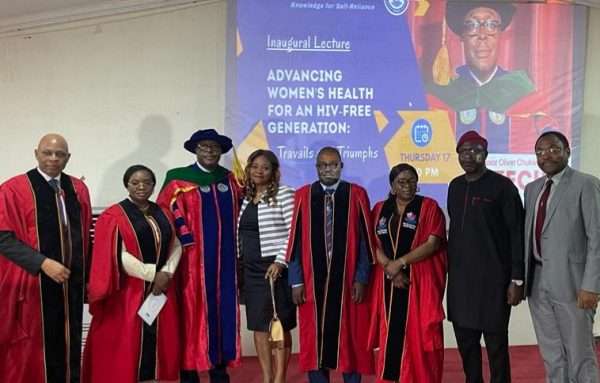
A Professor of Obstetrics and Gynaecology, at the Lead City University, Ibadan, Oliver Ezechi, has asserted that elimination of paediatric HIV is a possibility in Nigeria, having achieved less than one per cent Mother-to-Child HIV transmission (MTCT) in the last three years consecutively.
He stated that investigation conducted by his team of researchers confirmed that it has become possible to prevent the transmission of HIV from the mother to her baby.
Ezechi made this declaration in Ibadan, at the 15th Inaugural lecture, titled: ‘Advancing Women’s Health for an HIV-Free Generation: Travails and Triumphs’, held at Lead City University, Ibadan, at the weekend.
The maternal, reproductive and child health expert, highlighted factors fueling MTCT to include : large population of HIV positive women in the country; small proportion of pregnant women who know their HIV status; low HIV risk perception among married women; low HIV counselling and testing uptake; low antenatal attendance, among others.
In reducing the burden of MTCT of HIV globally and in Nigeria, he said it requires prevention of the causes and factors associated with increased MTCT of HIV. As such, he advised that identification of HIV infection should be immediately followed by an offer of linkage to lifelong treatment and care, including support to remain in care and virally suppressed.
He said: “Our team has shown that it is possible to eliminate paediatric HIV, as the last three consecutive years did not record a single mother-to-child transmission of HIV to unborn babies.
“Let the achievement at one spur us all to action. Know your HIV status today.
“Our team has provided a model for not only preventing mother-to-child transmission of HIV (vertical transmission) but also, prevention of horizontal transmission of HIV.
“We have produced evidence that has informed policy, shaped practice, and in the process showed that it is possible to reduce Mother-to-Child Transmission (MTCT) rate to less than one per cent”.
He noted that it had become obvious to all present that the country has made progress in the HIV response and it is pertinent to sustain it through more investigations on the infection.
The obstetrist and gynaecologist further stressed the essence of more research on HIV as he observed that there is limited studies in the area of MTCT, while findings from little available research are not
He therefore urged government, organised private sector and institutions to prioritise research, as it is the vehicle that drives development.
“We also observed that research is not fully accorded its pride of place, and the evidence generated with the little funding available is poorly utilised.
“Research products are meant to solve community problems; therefore, stakeholders should be engaged early in the process, if the output is to be utilised.
“Government, the public and academic institutions should as a matter of urgency put in place strategies to utilise research product, otherwise the resources invested in research becomes a waste.
“Academic institutions should put in place capacity strengthening programmes for their faculty to make them globally competitive to attract research funding.
“Research funding attracted to academic institutions should be a component of advancement criteria,” he said.










